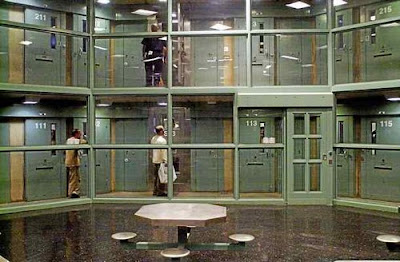 |
| Somers Northern Correctional Institution, Connecticut |
The death sentences of the Cheshire home invasion killers could be changed to consecutive life sentences at 2 separate hearings next week, the 1st proceedings to be held since last month's Supreme Court ruling that spared the lives of Connecticut's 11 formerly condemned murderers.
Superior Court Judge Jon C. Blue has scheduled arguments on pending motions by Steven Hayes and Joshua Komisarjevsky that say the killers' prison sentences should be corrected now that the state's highest court has said the death penalty is unconstitutional for all in Connecticut. Hayes' hearing is scheduled for Wednesday. Komisarjevsky's case will be heard June 17.
The motions to correct the death sentences were filed in November following the Supreme Court's initial August 2015 ruling outlawing capital punishment for all in the state. When that ruling was appealed, Blue stayed the motions until after the justices ruled again on the death penalty.
Following the May 26 decision, prosecutors in the Hayes case filed a motion June 3 saying that Blue should impose consecutive life sentences without the possibility of parole for Hayes. Prosecutors' response in Komisarjevsky's case could not be obtained Thursday.
Connecticut abolished the death penalty in April 2012 but made the law prospective, meaning it applied only to new cases and kept in place the death sentences already imposed before the bill was passed. The provision was added after the high-profile trials of Hayes and Komisarjevsky, who were sent to death row for killing Jennifer Hawke-Petit and her daughters, Hayley, 17, and Michaela, 11, during a July 2007 home invasion.
The men tied up and tortured the family as they ransacked the Petit home for cash and valuables. Komisarjevsky sexually assaulted Michaela, and Hayes raped and strangled Hawke-Petit. The house was doused with gasoline and set on fire. Hayley and Michaela died of smoke inhalation. The daughters' father and Hawke-Petit's husband, William Petit Jr., survived but was severely injured.
After the 2012 repeal of the death penalty, attorneys representing those on death row challenged the law, saying it violated the condemned inmates' constitutional rights. The state Supreme Court agreed to take up the prospective issue during a hearing in April 2013.
In August 2015, the justices ruled 4-3 to ban capital punishment for all defendants, saying in the majority decision that Connecticut's death penalty no longer fit with societal values and served no valid purpose as punishment, a ruling they echoed in a decision last month that essentially ended prosecutors' fight to keep execution possible for those already on death row.
After last month's ruling, Chief State's Attorney Kevin T. Kane said prosecutors would "move forward" and seek resentencing for the 11 death-row prisoners. His office is currently working with defense attorneys on how to handle the remaining - and older - cases of Robert Breton, Sedrick "Ricky" Cobb, Daniel Webb, Richard Reynolds, Todd Rizzo, Jessie Campbell III, Russell Peeler Jr., Lazale Ashby and Richard Roszkowski.
Once the inmates are resentenced, state officials will have to determine whether the inmates should remain or be transferred out of Northern Correctional Institution in Somers, the state's highest security prison.
While on death row, inmates were subjected to solitary confinement and more restrictions than inmates sentenced to life without parole. They were housed in single cells and received fewer recreation hours and less access to prison programs and visitors.
Source: Hartford Courant, June 10, 2016










